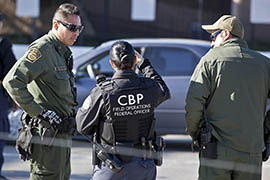Border Patrol pay reform would cut agents’ take-home, but add stability

Cronkite News
WASHINGTON – Reforming the Border Patrol pay system could save taxpayers $1 billion over the next decade, while giving peace of mind to agents whose pay has been threatened by sequestration, said supporters of a bill introduced Wednesday.
The bill by Sen. John McCain, R-Ariz., and Sen. Jon Tester, D-Mont., would overhaul what they called “an archaic and inefficient pay scale.” While it could mean the loss of about $7,000 a year in income for the average Border Patrol agent, the bill has the backing of the agents’ union, which said it would bring stability to pay and stronger security to the border.
“We wanted to make sure that border security was at 100 percent – that the agency wasn’t ratcheting down the manpower in the field – that was our No. 1 concern,” said Shawn Moran, vice president at large of the National Border Patrol Council, which approached Tester about creating the legislation.
“Second was stabilizing the pay for agents. This is the only way that we saw that was viable in today’s budgetary environment,” Moran said.
The Border Patrol Agent Pay Reform Act of 2013 would help get a handle on overtime pay, particularly the “irregular, unscheduled” hours that the Office of Personnel Management calls administratively uncontrollable overtime, or AUO.
Agents typically work 10-hour days, Moran said, including two hours of AUO, which is harder for the government to budget for. Because of that, Customs and Border Patrol has wanted to eliminate AUO for about a decade, he said.
Under the bill, agents would choose one of three pay levels – with a corresponding commitment of hours – at the beginning of each year and they would be paid the equivalent of straight time for those hours instead of overtime pay.
Agents could choose pay level 1, which requires 100 hours of work over a two-week pay period and would pay the base 80 hours of pay, plus a 25 percent differential – in essence, 100 hours at straight time. Pay level 2 would be a 90-hour commitment over two weeks, with a 12.5 percent pay differential. Agents who do not opt for level 1 or 2 would get the basic border patrol pay rate of straight pay for 80 hours per 14-day pay period.
Besides making budgeting easier, Moran said ensuring that agents will be paid for the hours they work is an advantage of the plan. And eliminating AUO could save about $125 million a year, the bill’s backers say.
“We knew we had to come up with something that was going be a savings to the taxpayers,” Moran said. “Obviously this is not the perfect plan, but rarely is anything in government.”
The bill does not yet have an official score from the Congressional Budget Office, but a spokeswoman from Tester’s office said they used the numbers from the union in estimating the cost savings from the overhaul.
Tester, whose state shares 545 miles of border with Canada, said he often hears agents complain about the current pay system. McCain said in a prepared statement that their bill “stabilizes and restructures the border patrol pay scale, allowing agents to put in the hours needed to secure the border while saving taxpayers millions of dollars each year.”
A spokesman for Customs and Border Protection said in an email that the agency does not comment on pending legislation “as a matter of policy.”
But Ronald Colburn, former deputy chief of the Border Patrol, said reform is overdue. In an email Wednesday, Colburn said that AUO no longer fits the roles and duties at Border Patrol, where overtime has become “frequent and routine.”
“Overtime reform is justified,” Colburn said. “In this rare instance, the USBP (U.S. Border Patrol) leadership, the … union and Congress seem to be in agreement on this.”















